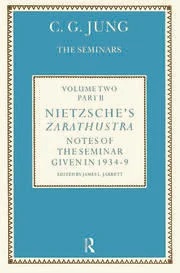C.G. Jung

C. G. Jung (1875 - 1961) was a Swiss psychiatrist, innovative thinker and founder of Analytical Psychology, whose most influential ideas include the concept of psychological archetypes, the collective unconscious, and synchronicity. He is the author of numerous works, including Memories, Dreams, Reflections and Man and His Symbols.
The Red Book: A Reader's Edition
The Red Book (catalogue number 29085), published to wide acclaim in 2009, contains the nucleus of C.G. Jung's later works. It was here that he developed his theories that would transform... (more)
The Earth has a Soul: The Nature Writings of C.G.Jung
Psychologist Meredith Sabini introduces a collection of Carl Jung's writings on the subject of nature. Jung asserts that society's loss of connection with nature has severed its link with the earthy,... (more)
The Zofingia Lectures: Collected Works Supplementary Volume 'A'
The Zofingia Club was a discussion group to which C.G. Jung belonged as a medical student: in 1897 he became Chairman, and gave five lectures. These have survived and are published here in a... (more)
Nietzsche's Zarathustra: Part 1 Notes of the Seminar given 1934-1939
An examination of one of the major philosophical influences on Jung that also provides a case study in Jungian psychology. (more)
Nietzsche's Zarathustra: Part 2 Notes of the Seminar given 1934-1939
These volumes, the transcript of a previously unpublished private seminar, reveal the fruits of Jung's early fascination with tales of Nietzsche's brilliance, eccentricity, and eventual decline into... (more)
The Archetypes and the Collective Unconscious (Collected Works: Vol. 9 Part 1)
The concept of "archetypes" and the hypothesis of "a collective unconscious" are two of Jung's better known ideas. In this volume, taken from the Collected Works, Jung describes and elaborates the... (more)
Visions: Notes on the Seminar Given in 1930-1934 - Edited by Claire Douglas (2 Volumes)
Jung taught 28-year old Christiana Morgan the trance-like technique of active imagination, helping her embark on a series of archetypal adventures which she depicted in paintings and he recounted his... (more)
Collected works Vol.18: The symbolic life - miscellaneous writings
Originally planned as a brief final volume in the Collected Works, The Symbolic Life has become the most ample volume in the edition, and one of unusual interest. It contains some 160 items spamming... (more)
The Red Book: Liber Novus
When Carl Jung embarked on the extended self-exploration he called his 'confrontation with the unconscious', the heart of it was The Red Book, a large, illuminated volume he created between 1914 and... (more)
On Theology and Psychology: The Correspondence of C. G. Jung and Adolf Keller
'This book collects highlights from the fifty-year correspondence between C. G. Jung (1875- 1961) and his friend Adolf Keller (1872-1963), a celebrated Swiss theologian who was one of the founders of... (more)
The Freud/Jung Letters: Complete Edition
The complete letters between Freud and Jung, discussing colleagues, strategies for advancing psychoanalysis, and their ultimate split.
Analytical Psychology: Notes of the Seminar Given in 1925 by C.G. Jung
In 1925 Jung gave the first of his formal seminars in English. Beginning with a notable personal discussion of his break with Freud the seminars move on to discuss the collective unconscious,... (more)
Psychology and religion
Based on the Terry lectures given at Yale University. 131 pages. (more)
Science of Mythology: Essays on the Myth of the Divine Child and the Mysteries of Eleusis
This is an account of the meaning and purpose of certain mythical themes found in antiquity and the relevance of such themes to our lives today. (more)
The Essential Jung: Selected Writings
This compact volume of key extracts from the formidable mass of Jung's published writings presents the essentials of Jung's thought in his own words. Anthony Storr's prefatory notes to each extract... (more)
Four Archetypes
The concept of the archetype is crucial to Jung's radical interpretation of the human mind. Here he considers the archetypes he regarded as fundamental to every living individual: mother, rebirth,... (more)
Essays on Contemporary Events: Reflections on Nazi Germany
Was the leading psychologist of his time a Nazi sympathiser? This was the question asked by many after the Second World War, as they sought to explain Jung's actions and publications during Nazi... (more)
Psychology of the Unconscious: A Study of the Transformations and Symbolisms of the Libido
The beginning of Jung's divergence from the psychoanalytical school of Freud "This book became a landmark, set up on the spot where two ways divided. Because of its imperfections and its... (more)
Children's Dreams: Notes from the Seminar Given in 1936-1940 by C. G. Jung
In the 1930s C.G. Jung embarked upon a bold investigation into childhood dreams as remembered by adults to better understand their significance to the lives of the dreamers. Jung presented his... (more)
Psychology and the East
C.G. Jung was a psychoanalyst who turned his attention to Eastern modes of thought. This book collects his writings on the subject, including his psychological commentaries on the I Ching and "The... (more)
Psychology and the Occult
This work presents a look at the world of the occult and the depths of the human psyche. It includes Jung's case study of a fifteen year old medium, and his writings on such subjects as ghosts,... (more)
The Spirit in Man, Art and Literature
This volume reveals the full range of Jung's involvement in this process, from his famous analysis of 'Psychology and Literature' to his landmark texts on Joyce's Ulysses and Picasso's paintings. (more)






























